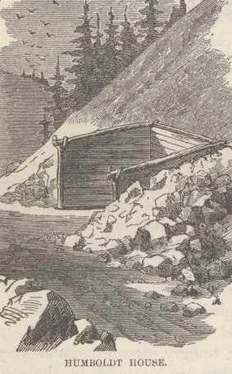Mark Twain - The Innocents Abroad
Здесь есть возможность читать онлайн «Mark Twain - The Innocents Abroad» весь текст электронной книги совершенно бесплатно (целиком полную версию без сокращений). В некоторых случаях можно слушать аудио, скачать через торрент в формате fb2 и присутствует краткое содержание. Год выпуска: 2004, Жанр: Классическая проза, Юмористическая проза, на английском языке. Описание произведения, (предисловие) а так же отзывы посетителей доступны на портале библиотеки ЛибКат.
- Название:The Innocents Abroad
- Автор:
- Жанр:
- Год:2004
- ISBN:нет данных
- Рейтинг книги:5 / 5. Голосов: 1
-
Избранное:Добавить в избранное
- Отзывы:
-
Ваша оценка:
- 100
- 1
- 2
- 3
- 4
- 5
The Innocents Abroad: краткое содержание, описание и аннотация
Предлагаем к чтению аннотацию, описание, краткое содержание или предисловие (зависит от того, что написал сам автор книги «The Innocents Abroad»). Если вы не нашли необходимую информацию о книге — напишите в комментариях, мы постараемся отыскать её.
The Innocents Abroad — читать онлайн бесплатно полную книгу (весь текст) целиком
Ниже представлен текст книги, разбитый по страницам. Система сохранения места последней прочитанной страницы, позволяет с удобством читать онлайн бесплатно книгу «The Innocents Abroad», без необходимости каждый раз заново искать на чём Вы остановились. Поставьте закладку, и сможете в любой момент перейти на страницу, на которой закончили чтение.
Интервал:
Закладка:
Well, we were at home in Palestine. It was easy to see that that was the grand feature of the expedition. We had cared nothing much about Europe. We galloped through the Louvre, the Pitti, the Ufizzi, the Vatican—all the galleries—and through the pictured and frescoed churches of Venice, Naples, and the cathedrals of Spain; some of us said that certain of the great works of the old masters were glorious creations of genius, (we found it out in the guide-book, though we got hold of the wrong picture sometimes,) and the others said they were disgraceful old daubs. We examined modern and ancient statuary with a critical eye in Florence, Rome, or any where we found it, and praised it if we saw fit, and if we didn't we said we preferred the wooden Indians in front of the cigar stores of America. But the Holy Land brought out all our enthusiasm. We fell into raptures by the barren shores of Galilee; we pondered at Tabor and at Nazareth; we exploded into poetry over the questionable loveliness of Esdraelon; we meditated at Jezreel and Samaria over the missionary zeal of Jehu; we rioted—fairly rioted among the holy places of Jerusalem; we bathed in Jordan and the Dead Sea, reckless whether our accident-insurance policies were extra-hazardous or not, and brought away so many jugs of precious water from both places that all the country from Jericho to the mountains of Moab will suffer from drouth this year, I think. Yet, the pilgrimage part of the excursion was its pet feature—there is no question about that. After dismal, smileless Palestine, beautiful Egypt had few charms for us. We merely glanced at it and were ready for home.
They wouldn't let us land at Malta—quarantine; they would not let us land in Sardinia; nor at Algiers, Africa; nor at Malaga, Spain, nor Cadiz, nor at the Madeira islands. So we got offended at all foreigners and turned our backs upon them and came home. I suppose we only stopped at the Bermudas because they were in the programme. We did not care any thing about any place at all. We wanted to go home. Homesickness was abroad in the ship—it was epidemic. If the authorities of New York had known how badly we had it, they would have quarantined us here.
The grand pilgrimage is over. Good-bye to it, and a pleasant memory to it, I am able to say in all kindness. I bear no malice, no ill-will toward any individual that was connected with it, either as passenger or officer. Things I did not like at all yesterday I like very well to-day, now that I am at home, and always hereafter I shall be able to poke fun at the whole gang if the spirit so moves me to do, without ever saying a malicious word. The expedition accomplished all that its programme promised that it should accomplish, and we ought all to be satisfied with the management of the matter, certainly. Bye-bye!
MARK TWAIN.
I call that complimentary. It is complimentary; and yet I never have received a word of thanks for it from the Hadjis; on the contrary I speak nothing but the serious truth when I say that many of them even took exceptions to the article. In endeavoring to please them I slaved over that sketch for two hours, and had my labor for my pains. I never will do a generous deed again.
CONCLUSION
Nearly one year has flown since this notable pilgrimage was ended; and as I sit here at home in San Francisco thinking, I am moved to confess that day by day the mass of my memories of the excursion have grown more and more pleasant as the disagreeable incidents of travel which encumbered them flitted one by one out of my mind—and now, if the Quaker City were weighing her anchor to sail away on the very same cruise again, nothing could gratify me more than to be a passenger. With the same captain and even the same pilgrims, the same sinners. I was on excellent terms with eight or nine of the excursionists (they are my staunch friends yet,) and was even on speaking terms with the rest of the sixty-five. I have been at sea quite enough to know that that was a very good average. Because a long sea-voyage not only brings out all the mean traits one has, and exaggerates them, but raises up others which he never suspected he possessed, and even creates new ones. A twelve months' voyage at sea would make of an ordinary man a very miracle of meanness. On the other hand, if a man has good qualities, the spirit seldom moves him to exhibit them on shipboard, at least with any sort of emphasis. Now I am satisfied that our pilgrims are pleasant old people on shore; I am also satisfied that at sea on a second voyage they would be pleasanter, somewhat, than they were on our grand excursion, and so I say without hesitation that I would be glad enough to sail with them again. I could at least enjoy life with my handful of old friends. They could enjoy life with their cliques as well—passengers invariably divide up into cliques, on all ships.
And I will say, here, that I would rather travel with an excursion party of Methuselahs than have to be changing ships and comrades constantly, as people do who travel in the ordinary way. Those latter are always grieving over some other ship they have known and lost, and over other comrades whom diverging routes have separated from them. They learn to love a ship just in time to change it for another, and they become attached to a pleasant traveling companion only to lose him. They have that most dismal experience of being in a strange vessel, among strange people who care nothing about them, and of undergoing the customary bullying by strange officers and the insolence of strange servants, repeated over and over again within the compass of every month. They have also that other misery of packing and unpacking trunks—of running the distressing gauntlet of custom-houses—of the anxieties attendant upon getting a mass of baggage from point to point on land in safety. I had rasher sail with a whole brigade of patriarchs than suffer so. We never packed our trunks but twice—when we sailed from New York, and when we returned to it. Whenever we made a land journey, we estimated how many days we should be gone and what amount of clothing we should need, figured it down to a mathematical nicety, packed a valise or two accordingly, and left the trunks on board. We chose our comrades from among our old, tried friends, and started. We were never dependent upon strangers for companionship. We often had occasion to pity Americans whom we found traveling drearily among strangers with no friends to exchange pains and pleasures with. Whenever we were coming back from a land journey, our eyes sought one thing in the distance first—the ship—and when we saw it riding at anchor with the flag apeak, we felt as a returning wanderer feels when he sees his home. When we stepped on board, our cares vanished, our troubles were at an end—for the ship was home to us. We always had the same familiar old state-room to go to, and feel safe and at peace and comfortable again.
I have no fault to find with the manner in which our excursion was conducted. Its programme was faithfully carried out—a thing which surprised me, for great enterprises usually promise vastly more than they perform. It would be well if such an excursion could be gotten up every year and the system regularly inaugurated. Travel is fatal to prejudice, bigotry and narrow-mindedness, and many of our people need it sorely on these accounts. Broad, wholesome, charitable views of men and things can not be acquired by vegetating in one little corner of the earth all one's lifetime.
The Excursion is ended, and has passed to its place among the things that were. But its varied scenes and its manifold incidents will linger pleasantly in our memories for many a year to come. Always on the wing, as we were, and merely pausing a moment to catch fitful glimpses of the wonders of half a world, we could not hope to receive or retain vivid impressions of all it was our fortune to see. Yet our holyday flight has not been in vain—for above the confusion of vague recollections, certain of its best prized pictures lift themselves and will still continue perfect in tint and outline after their surroundings shall have faded away.
Читать дальшеИнтервал:
Закладка:
Похожие книги на «The Innocents Abroad»
Представляем Вашему вниманию похожие книги на «The Innocents Abroad» списком для выбора. Мы отобрали схожую по названию и смыслу литературу в надежде предоставить читателям больше вариантов отыскать новые, интересные, ещё непрочитанные произведения.
Обсуждение, отзывы о книге «The Innocents Abroad» и просто собственные мнения читателей. Оставьте ваши комментарии, напишите, что Вы думаете о произведении, его смысле или главных героях. Укажите что конкретно понравилось, а что нет, и почему Вы так считаете.












